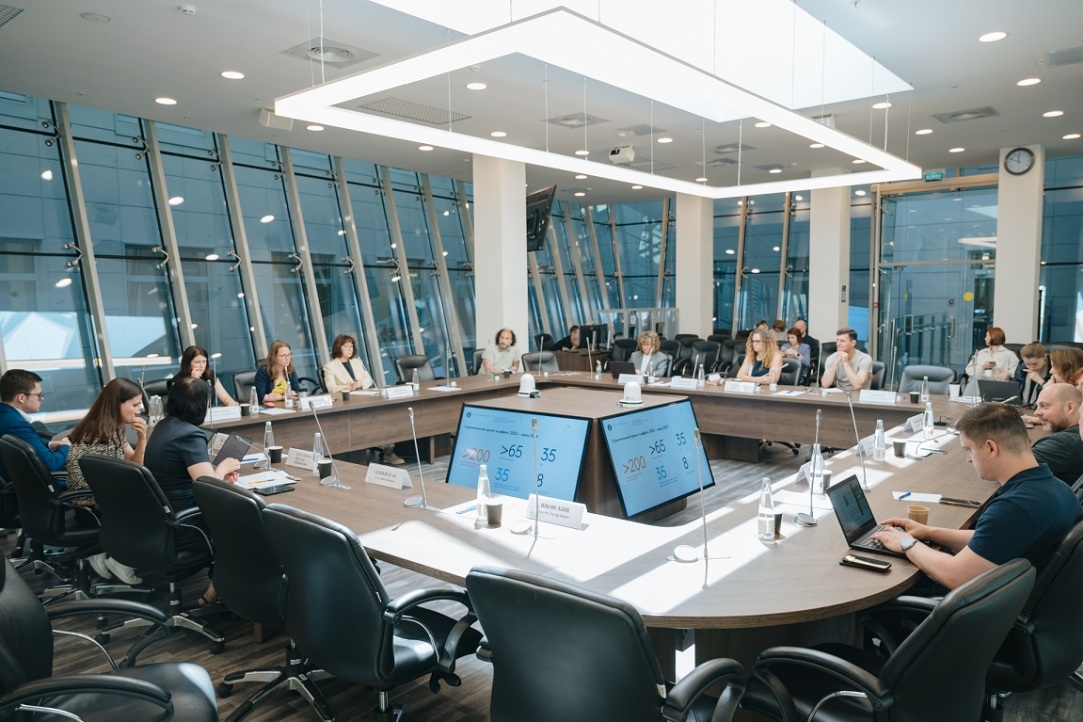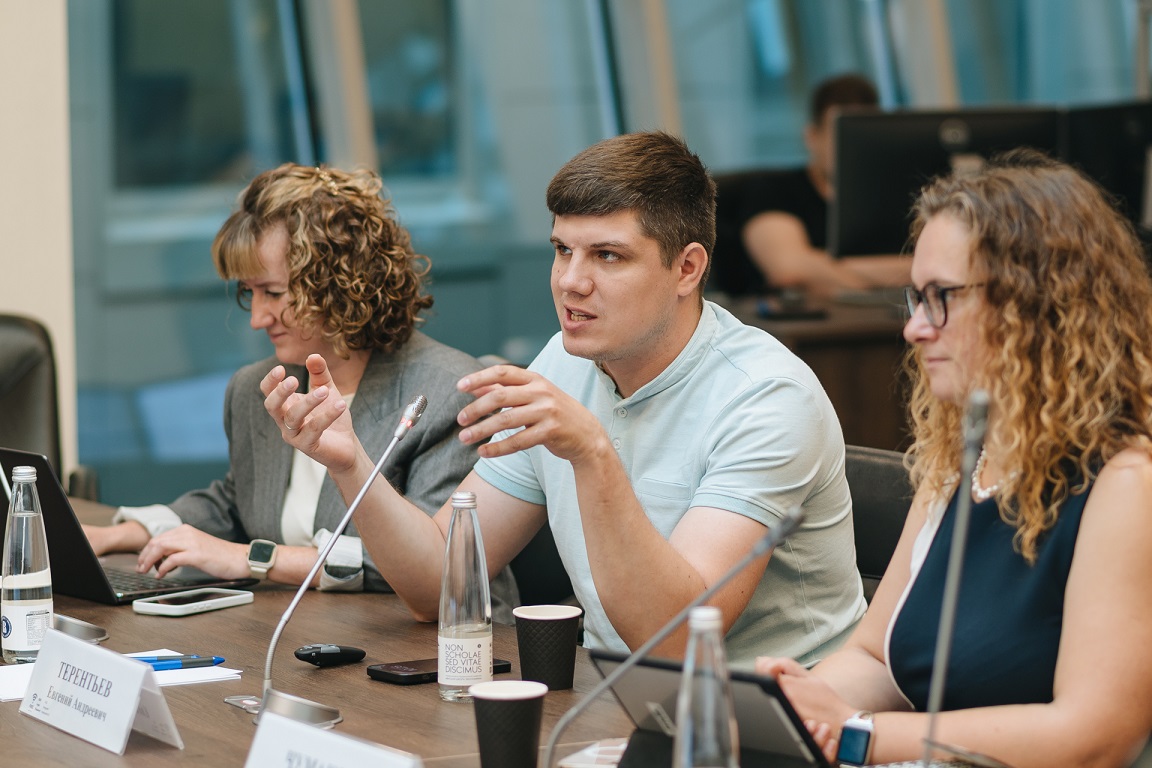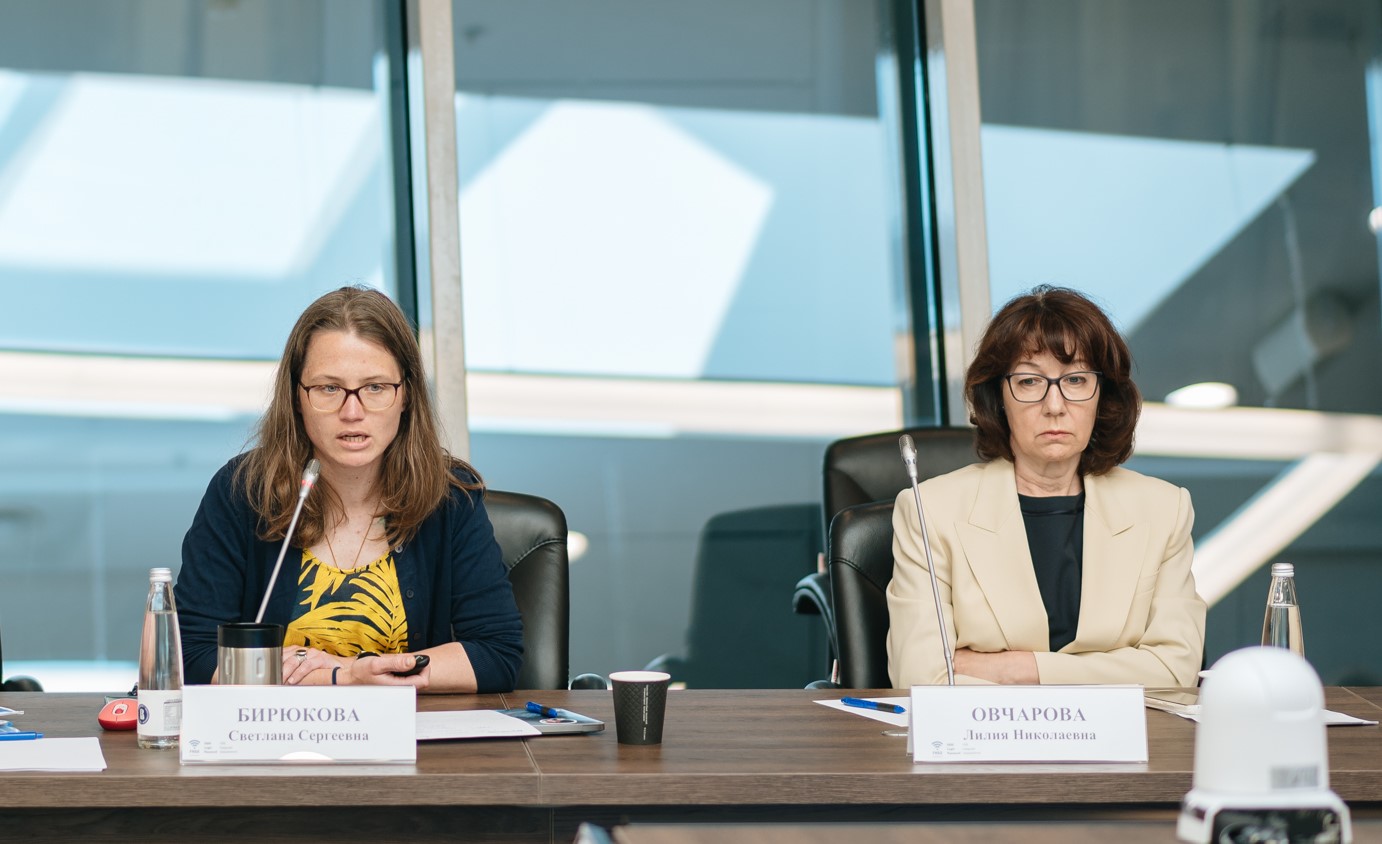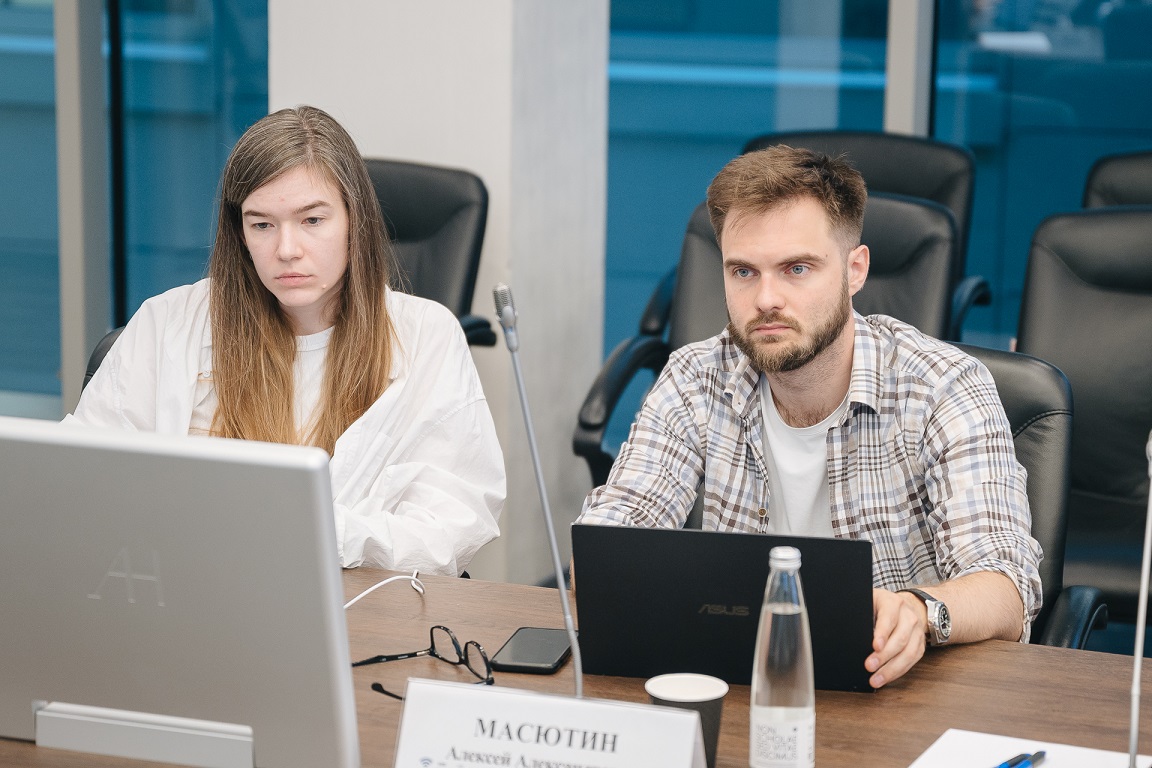Exploring Research Prospects and Collaboration Opportunities: Discussion of Strategic Projects Held at HSE University

On June 26 and 27, HSE University at Pokrovka hosted a discussion of potential partnerships between the university's research teams and strategic projects under the Priority 2030 programme. During the two-day session, the heads of strategic projects presented the main areas of their ongoing research, highlighted some of the key results achieved, and shared their vision for involving new researchers in the projects.
The session participants were welcomed by Natalia Vatolkina, Deputy of Vice Rector Elena Odoevskaya who coordinates the implementation of the HSE Development Programme. The speaker presented the goals and objectives of the session, introduced the Priority 2030 academic leadership programme, and highlighted the role of strategic projects in the transformation of HSE University.
The Priority 2030 programme aims to support the development of Russian universities, to enhance their scientific and technological potential, and to increase their contribution to achieving Russia's national development goals and ensuring access to quality higher education across Russian regions. The programme involves over 140 universities in 56 regions of Russia, including 54 within the framework of specialised tracks. In 2024, HSE University ranks first among the programme participants in terms of grant amount, thus establishing itself as one of the leaders in the Research Leadership track.
Strategic projects are portfolios of research initiatives under a shared theme. They aim not only to achieve new scientific results with high potential for transfer to the economy and the social sphere but also to drive institutional transformations within HSE University to meet its target model under the Priority 2030 programme. Every year, over 1,000 researchers from more than 55 subdivisions of HSE University participate in the implementation of strategic projects.
Two main models of cooperation between research teams and strategic projects were outlined at the seminar. Researchers can either use strategic projects as platforms to discuss and promote their own scientific results or contribute to shaping the research agendas of the relevant strategic projects. Fuad Aleskerov, Director of the International Centre of Decision Choice and Analysis, proposed conducting an event to showcase work in progress which may be of interest to strategic project teams. Additionally, researchers can propose their own projects for integration into strategic projects.
Presentations by representatives of strategic project teams covered current research areas, future plans, and the competencies they aim to attract to their projects. Presenting the strategic project 'Success and Self-Sustainability of the Individual in a Changing World,' Evgeniy Terentev, Director of the HSE Institute of Education and academic supervisor of the strategic project, outlined the project architecture and pointed out the key elements included in the concept of 'human enhancement.'

'Today, we are witnessing the emergence of numerous opportunities for human enhancement across various fields. However, there is currently no ongoing monitoring of these emerging opportunities, no established procedure for evaluating the effectiveness of existing tools, and a lack of systematic scientific knowledge on how to encourage people to use these new opportunities. Our strategic project revolves around addressing these three issues,' Evgeniy Terentev said.
The implementation of the strategic project has resulted in several outcomes: the first wave of monitoring the use of human enhancement tools has been completed, groundwork has been laid for the development of specific enhancement technologies, recommendations have been formulated to encourage the adoption of engineering and socio-humanitarian technologies by the public, a pool of recommendations for improving existing institutions has been produced, and strategies for student learning behaviour have been identified.
The Strategic Project 'Social Policy for Sustainable Development and Inclusive Economic Growth' was presented by its academic supervisor, Director of the HSE Institute for Social Policy Lilia Ovcharova, and coordinator Svetlana Biryukova. According to the speakers, the strategic project aims to propose a comprehensive model of sustainable social development tailored to the national context. It focuses on creating and promoting evidence-based social policy tools, implementing measures to enhance economic inclusivity, and formulating policies to foster social sustainability and improve the well-being of Russian citizens, particularly that of families.

The project implementation has produced significant results both at the university level and nationally. Lilia Ovcharova also highlighted the role of the strategic project's team as a centre of expertise supporting the development of state social policy measures.
Lilia Ovcharova emphasized the importance of attracting new researchers and new initiatives to the strategic project. This is especially important for creating new, in-demand expert analytical products and populating the digital bank of evidence-based social policy measures to support management decision-making, which is one of the key planned outcomes of the strategic project.
Learn more about this strategic project from Lilia Ovcharova's interview.
Presenting the Strategic Project 'Human Brain Resilience: Neurocognitive Technologies for Adaptation, Learning, Development and Rehabilitation in a Changing Environment,' Igor Sokolov, HSE Director for Research and Development and administrative manager of the strategic project, stressed the project team's priority of developing technologies that enhance human abilities, or 'augmented intelligence,' which place the individual in the centre and organise technologies around and for the individual. To achieve this, HSE University has been developing a distributed neurocognitive cluster that includes teams from all its campuses.

'In the foreseeable future, we believe we will be able to establish the first Centre for Assistive Technologies and Augmented Intelligence to help people solve problems that are otherwise very difficult or impossible to address without such technologies,' according to Igor Sokolov.
By 2030, plans include creating a prototype of a new-generation magnetoencephalograph to support import substitution in this field, developing next-generation neuroprostheses using brain-computer interfaces, creating prototype algorithms for a hearing diagnostic system based on machine learning and neuromodelling, and achieving several other applied results.
In conclusion, Igor Sokolov proposed convening a joint session to explore the possibilities of commercialising the applied results from all strategic projects, with the participation of the HSE Network Centre for Technology Transfer. Additionally, he emphasised the importance of popularising science and building competencies in science journalism to successfully promote HSE University's research in the field of cognitive neuroscience.
The Strategic Project 'National Centre of Science, Technology and Socio-Economic Foresight' was presented by Mikhail Goland, Director of the HSE Centre for Strategic Forecasting and administrative head of the project. According to Mikhail Goland, the primary goal of the strategic project is to establish a global centre of excellence in forecasting based at HSE University, and key objectives include developing a series of medium- and long-term forecasts to create a comprehensive future outlook, while identifying priorities for advancing science, technology, economic sectors, and social innovations. The project also aims to foster a scientific school of forecasting at the university, particularly by involving students, including doctoral students, in related projects, and promoting a culture of foresight studies in Russia and internationally.

The most significant results of this strategic project to date include conducting a large-scale study on scenarios for Russia's socio-economic development until 2030, establishing a library of methods, models, and tools for scientific, technological, and socio-economic forecasting, producing a series of high-level monographs on scientific and technological forecasting and foresight, and launching several educational programmes in this field.
The new Strategic Project 'Human-Centred AI ,' initiated in 2024, was presented by Alexey Masyutin, Director of the HSE AI and Digital Science Institute, and Elena Kozhina, coordinator of this strategic project and projects in AI and digital science, and Deputy to Vice Rector Elena Odoevskaya.

The main goal of the project is to develop a series of products using AI technologies that assist people in areas such as education, management, and medicine. Priorities for the coming years include the development of AI assistants to help HSE University's students and staff with routine tasks and to contribute to the educational process and applications to enhance the diagnostic capacity in spinal surgery and postoperative rehabilitation for the university’s partner healthcare providers. Another envisioned area of focus is market research to identify sectors where the introduction of artificial intelligence technologies holds the most promise.
The key advantage of the strategic project lies in the team's extensive experience in developing and implementing products across various industries, which they are prepared to share with other researchers at HSE University. In its turn, the strategic project is actively seeking new ideas for AI products that can enhance human life.
Ideas and suggestions
Throughout the session, participants asked questions about each project, discussed prospects for cooperation with various stakeholders, and offered ideas for project development. The attending researchers were interested in whether market assessments had been conducted for the projects, how product testing would be performed, how interdisciplinary teams could be recruited within HSE University, whether there were prospective customers and external inquiries, and how project team members were responding to them.

Wrapping up the session, Natalia Vatolkina invited participants who were not yet on the strategic project teams to share their ideas on the project content and ways to promote the results.
See also:
Five Strategies for the Future: Key Achievements of HSE Strategic Projects in 2024
During the past year, scientists at HSE University have worked on five strategic projects aimed at advancing key areas essential to the development of modern individuals and society. Each of these projects is unique, yet they share common goals: creating innovative product solutions, generating fresh ideas for the economy, social sector, science, and education, and contributing to the university's research potential.
'We Are Creating the Medicine of the Future'
Dr Gerwin Schalk is a professor at Fudan University in Shanghai and a partner of the HSE Centre for Language and Brain within the framework of the strategic project 'Human Brain Resilience.' Dr Schalk is known as the creator of BCI2000, a non-commercial general-purpose brain-computer interface system. In this interview, he discusses modern neural interfaces, methods for post-stroke rehabilitation, a novel approach to neurosurgery, and shares his vision for the future of neurotechnology.
Humans, Bots, and Digital Twins: Year-End Results of the Strategic Project 'Human Brain Resilience'
HSE University hosted a joint research seminar to review the 2024 results of the Strategic Project 'Human Brain Resilience: Neurocognitive Technologies for Adaptation, Learning, Development and Rehabilitation in a Changing Environment.' The event showcased the progress and outcomes of fundamental and applied projects focused on developing technologies for neurodiagnostics, neuroadaptation, and neurorehabilitation—collectively known as 3N technologies. The objective is to develop tools that can help prevent neurogenic and psychiatric disorders or alleviate their consequences.
HSE and Integration Education Centre to Develop New Programmes for Agrobiotech Advancement
HSE University and ANO Integration plan to jointly develop projects aimed at creating new approaches to education and advancing innovative agrobiotechnologies. The parties signed the corresponding agreement at the XI Congress ‘Innovative Practice: Science Plus Business.’
Virtual Mozart, Venture Capital Bot, and Educational Video Generation: How AI is Used at HSE University
In mid-November, HSE University hosted a meetup where faculty, researchers, and administrators presented their projects and shared experiences with using AI technologies in education and research. The meeting was part of the continuing professional development programme 'Artificial Intelligence in Education and Research.'
(Ab)normal Language: HSE Researchers Present Digital Tools for Assessing Mental Health Problems
Often, individuals with neurological or mental disorders exhibit distinctive language patterns. In modern clinical practice, digital tools can play a significant role in supporting language therapy and rehabilitation for persons with language disorders. Additionally, in the future, digital tools could assist healthcare specialists in assessing the severity of symptoms associated with such disorders.
HSE Scientists Propose Using Heart Rate Analysis to Diagnose Anxiety and Depression
A group of scientists at HSE University have discovered how anxiety and depression can be diagnosed by analysing heart rate. It turns out that under mental stress, the heart rate of individuals with a predisposition to mental health disorders differs from that of healthy individuals, especially when performing more complex tasks. These changes in cardiovascular parameters can even be detected using a pulse oximeter or a smartwatch. The study findings have been published in Frontiers in Psychiatry.
Narcissistic and Workaholic Leaders Guide Young Firms to Success
Scientists at HSE University—St. Petersburg studied how the founder's personal characteristics impact a young firm's performance. It turns out that a narcissist and workaholic who also fosters innovation will effectively grow their company. The paper has been published in IEEE Transactions on Engineering Management.
Keep Your Eyes On: A Prospective Device for Self-Monitoring Vision
As part of the Strategic Project 'Success and Self-Sustainability of the Individual in a Changing World,' scientists at HSE University have conducted a study to develop an electronic device designed to reduce the risk of occurrence and progression of eye diseases.
Russian-Italian Projects in Biomedicine Discussed at HSE University
HSE University hosted an international mini-conference titled 'Search for new ways to develop Russian-Italian cooperation in the field of Biomedicine,' attended by scientists from both countries and HSE Rector Nikita Anisimov.


